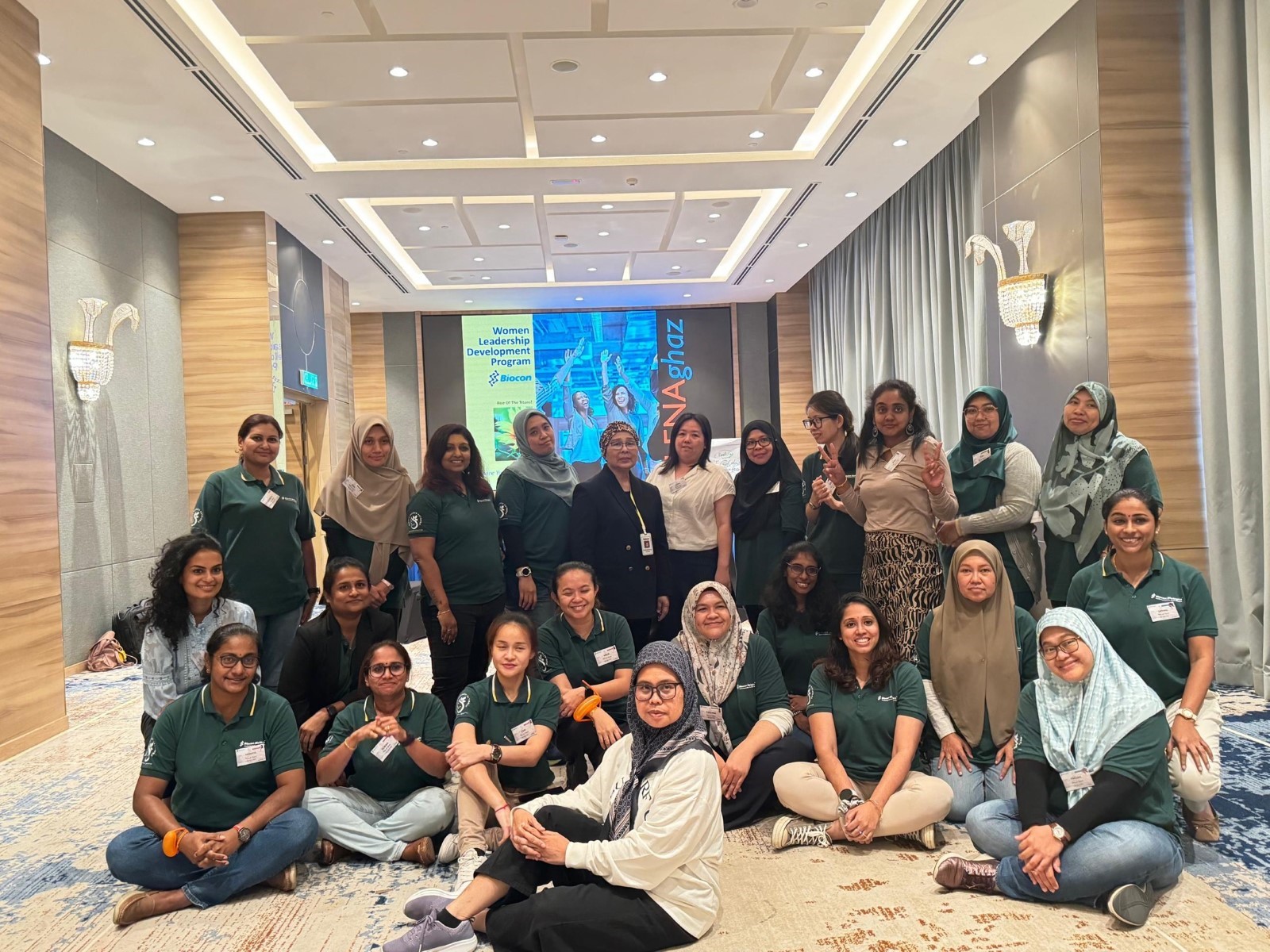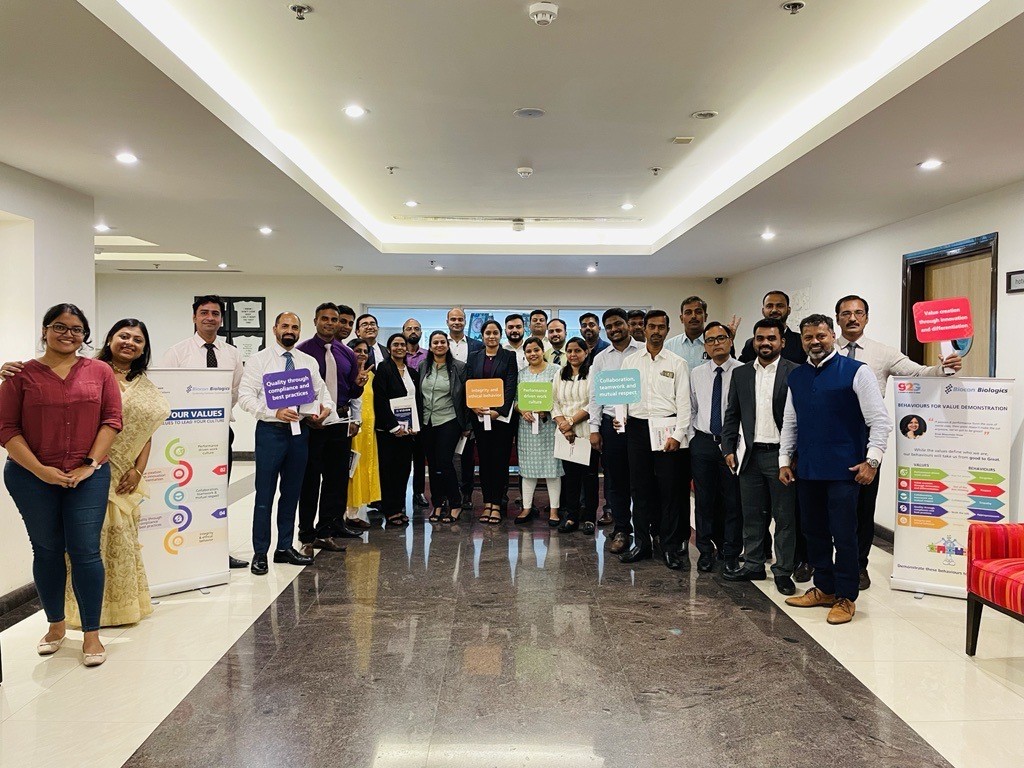“Your mom is working so hard, isn’t she?” someone asks a six-and-a-half year old. Pat comes the child’s reply: “She’s going to be the CEO of a company someday.”
Sowmya Vinayak Koneri narrates her daughter’s exchange with pride, to illustrate the ripple effect that having women leaders can make on society.
Koneri is Senior Manager of the Commercial Advanced Markets team at Biocon Biologics in Bengaluru, where there is no dearth of women in leadership. You’ve almost certainly heard of them: they’re part of the global biopharmaceutical company Biocon, which, across subsidiaries Biocon Biologics and Syngene, has a workforce of nearly 20,000. Around 30% of this workforce is women, up from 18% at the end of FY2021. Women represent 50% of their research and development workforce in India, a number that touches 65% in some global offices. In 2021 and 2022, Biocon was certified by Great Place to Work among India’s Best Workplaces in Diversity, Equity & Inclusion.
You might say it’s in their DNA.
When the company began in 1978 by manufacturing and exporting plant enzymes, it wasn’t just setting the stage for biotechnology advancement in the country. It was also paving the way for a generation of women leaders in business, thanks to founder Kiran Mazumdar-Shaw.
Nearly fifty years later, Chella Pandian Pitchai, Global Head of DEI & Leadership at Biocon Biologics, emphasises the importance of this foundation. Being led by a woman, he says, is the “most obvious symbol.” Mazumdar-Shaw overcame her own challenges to found the company, and was passionate about building it to be more gender-equitable, Pitchai explains.
Years ago, even without a structured DEI process in place, there was a stage where 60% decision makers were women and 50% of the top leaders were women. Biocon Biologics reports having hired the first and second-ever women managers in manufacturing in the country, back in 1997 and 1998. And, Pitchai says, they have had facilities like gender-neutral toilets all the way back in 1997. “All of this happened because it was an inclusive approach, not because we wanted to hit a number.”
All of that was before the company achieved some of its most significant international growth. As business grew and globalised, Biocon Biologics expanded their staff in around 25 countries. The effort to maintain gender balance in their workforce intensified, too. So, in 2020, they came up with their 2030 vision to become an equal company, bringing in all forms of gender and diversity.
It’s a goal taken seriously by the top management and throughout the company. “It’s not just having 50-50 percent male and female,” Pitchai told me. “It means people who are working with us feel that we are not discriminated or feeling less valued, whether belonging to a minority or majority segment. We are not going to measure by the percentage [of representation] but by the feeling of belongingness.”
How They Do It
Apart from a dedicated DEI department, Biocon Biologics has a full-fledged Culture, Values and Belongingness team that sustains a support system for employees to deal with any bias they might encounter, and works to foster a better sense of belongingness – the sense of enhanced value and ownership in the relationship between employee and institution. Their employee orientation programme includes a mandatory Unconscious Bias training, apart from PoSH (Prevention of Sexual Harassment) training in India, and its counterpart training in other countries. Teams conduct regular PoSH and bias audits for issues in performance management, learning and development, promotions, and more.
I also learned that Biocon Biologics takes its Employee Resource Groups seriously.
ERG leaders get a weighted goal which is linked to their performance and bonus. Groups include one for new moms, and the BWN (Biocon Biologics Women's Network), with chapters across departments. I find this interesting, especially since many companies struggle to balance intent with action when they set up ERGs.
To Pitchai, they can help create “magic.”
At Biocon Biologics, apart from its key role for leaders, colleagues volunteer because they see value and benefit in being part of forums for tangible action. The ERGs are backed by a DEI council with senior managers, and support from the CEOs and the chairperson.
Women Representation Is An Opportunity
Returnship – ensuring that women continue their careers following critical life stages, including marriage and parenthood – is a persistent problem in Indian workplaces. At Biocon Biologics, a Back to Work programme has been helping mitigate this. Women rejoining work after a break are handheld through the initial months, with the opportunity to reskill or upskill with a buddy mentor they can turn to for support.
Beyond this cohort, a ‘BioWin’ forum brainstorms for ideas which can empower women employees and help them grow, and a Be One Bring One referral programme helps expand the female workforce. But perhaps one of the most impactful boosts comes from specially designed management courses for women employees by the Indian Institute of Management, Bangalore (IIM-B).
I met Anita Rao, Biocon Biologics’ Global Head – ASAT (Analytical Science and Technology), who said that being in the initial cohort was a gamechanger. It helped her network with colleagues across functions, gain mentorship from leaders, find opportunities to present her ideas in management meetings and see herself as a leader. The course requires students to execute an actual project in the company, and to present it to the IIM-B faculty. The course changed the way Biocon invested in its women leaders, says Rao. A lot more women development programmes are now on offer and the IIM-B course has been further enhanced.
“They make sure I enroll in courses periodically, I grow,” she says. “The continuous effort and investment make a difference for internal people, and (we’re) balancing it with hiring talent from outside, so they bring in their global perspective. You see women leaders in all lead positions in different parts of the globe."

A picture from Biocon Biologics' Women Leadership Development program for its women employees in Malaysia.
When Rao joined the company’s R&D function in 2011, there were just a couple of women, she recalls. It puts the extraordinary change over the last few years into perspective. Rao credits that change to a shift in awareness. Recognising the need, trusting internal talent, training, giving opportunities, investing in women and continuing to do so - Rao identifies these as key elements in Biocon’s journey.
Perhaps most importantly, I found, it’s Biocon’s employees themselves who’ve strived for changes big and small. The framework for the Back to Work programme was conceptualised from inputs by Hemalatha Ramu, Senior Director Human Resources, who had herself taken a break in her two-decades long career. Ramu tells me that Biocon Biologics’s global manufacturing head makes it a point to meet women employees once a quarter, just as they also attend specific connect sessions with the COO. With a young daughter at day care, Anita Rao pushed for flexible work hours and options to work from home. She brought it up in HR surveys and town halls, and found other women who had done the same. Their advocacy encouraged the arrangements to eventually come through – and then, the Covid years helped streamline them. In all instances, Rao says, Biocon Biologics was open to listening even when policies weren’t present.
When Women Lead
Rao was an early sceptic of the idea that women need other women leaders to be inspired, but isn’t anymore, because of Rhonda Duffy.
Rao saw how things changed when Duffy took charge as the company’s Chief Operating Officer a little over a year ago. “Before her, I don't think I saw myself in those business executive positions. But after seeing her, I said, ‘Okay, if I do this, there is an opportunity. Maybe I will go there. Right.’ And that is an inspiration,” says Rao. The “how-to” guidance and encouragement to “think from different perspectives” Duffy brings as a woman is invaluable, Rao feels.
Women at the top drive policy change – and culture. Watching Kiran Mazumdar-Shaw on television is what brought Archana Rana, Associate Director, Microbiology Department, from Himachal Pradesh to Bengaluru. A co-lead for the BWN, she has interacted with women employees across functions, helping them overcome challenges at the workplace and more. Rana and Koneri both believe in an attuned empathetic ability women leaders bring as an advantage for co-workers.
“It's growth for us, and it's DEI for the company. But in the end, it is general women development all over, right?” Rao remarks.
Overcoming Challenges
Understandably, sustaining a diverse workforce is not without its challenges. Manufacturing, as Ramu explains, remains associated as a sector for men, heavy machinery, huge instruments, fermenters and bioreactors. Changing this mindset and the reality on the shopfloor has been a gradual process over the last five years. “We started off hiring in the peripheral areas,” she recounts. “We were able to hire women in packaging, visual inspection and medical devices team, some amount of upstream and downstream.” The company has also been able to expand women representation through the NAPS (National Apprenticeship Promotion Scheme) programme, hiring 100% women trainees in manufacturing in 2022 in Biocon Biologics.
Then there’s the challenge of shifts. If you don't maintain the balance, men end up doing the night shift and women end up coming in the general shift,” she says. The company helped managers to identify more roles for women and given the confidence to implement changes – sometimes, it meant something as fundamental as arranging for a forklift to make heavy lifting easier. It’s an excellent example of how enabling inclusion for some groups really means making work easier and more productive for the whole workforce. It’s the sort of thing that’s materially made the difference in representation: the manufacturing function now has around 31% female workforce in Biocon Biologics, Ramu tells me.
DEI And Business Goals
“If there is no diversity, there is no need for inclusion,” Pitchai says, as we are thinking through the importance of DEI for an institution and for society. “So, inclusion is an outcome of diversity and diversity fuels innovation. And when these two are there, equity nicely sits in the middle to enable these two.”

Biocon Biologics conducts culture and values roadshows for its employees to emphasise on inclusiveness and collaboration.
I find it an inspiring idea: that through diversity, equity, culture, and values, we create the belongingness that will create the environment for a successful company, and ultimately, society. For Biocon, this value is inseparable from the quest for innovation that makes its success possible. They see a future dedicated to making their DEI practises sustainable, ensuring that impact can be measured, shared and celebrated.
For women employees like Archana Rana, those ideas are inseparable from life.
When Rana signed up for an MBA in quality management system with Biocon Biologics’ support, it inspired her friend who is on a career break to apply at Biocon Biologics too.
I think back to the distance Rana has travelled, and her early glimpse of Kiran Mazumdar-Shaw on TV. In turn, her story has encouraged many young women from her hometown to pursue their dreams, she says.
“I think every woman should remember she can do anything. That is my funda too. That I can do anything.”
Text by Annie Philip and images provided by the Biocon Biologics team.
It’s not just having 50-50 percent male and female. It means people who are working with us feel that we are not discriminated or feeling less valued, whether belonging to a minority or majority segment. We are not going to measure by the percentage [of representation] but by the feeling of belongingness.
- Chella Pandian Pitchai, Global Head of DEI & Leadership at Biocon Biologics